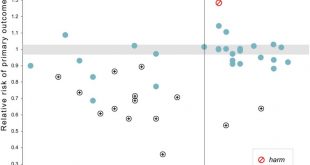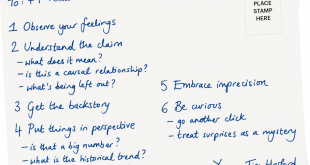Guest post by Jeff Mosenkis of Innovations for Poverty Action. A nicely designed and helpful media guide for researchers on how to prepare for interviews with journalists, based on a survey of science writers. It’s divided into before, during, and after the interview and gives concrete advice about what to expect and do in each. Having two women on a board of directors appears to be the new having one woman on a board of directors. With “tokenism” becoming more obvious, Chang, Milkman,...
Read More »IPA’s weekly links
Guest post by Jeff Mosenkis of Innovations for Poverty Action. Preregistration stops medications from working Tyler Cowen interviewed Chris Blattman and in typical Cowen fashion came prepared – I had to slow down my usual podcast playback speed to keep up. Topics Included what Chris learned from his first job at a higher class Canadian KFC, interviewing child soldiers, causes of the Peloponnesian Wars, why he’d rather transfer accountants to poor countries than cash, and how he tries to...
Read More »IPA’s weekly links
Guest Post by Jeff Mosenkis of Innovations for Poverty Action. Above, Tim Harfords postcard rules for reading statistics (gated), inspired by Harold Pollack’s personal finance rules index card. ER docs seem to use mental heuristics – patients are more likely to get tested for and diagnosed with a heart attack if they go right after their 40th birthday than right before (job market paper from Stephen Coussens). Dick Thaler’s Nobel Prize-winning Mental Accounting paper was originally rejected...
Read More »IPA’s weekly links
Guest post by Jeff Mosenkis of Innovations for Poverty Action. An interesting new Center for Global Development working paper looks at the effects of family planning services becoming available across Malaysia. They find that it helped girls earn more later in life, even those too young to benefit directly from the program. Girls just born grew up to earn more (and were more likely to have their elderly parents move in with them), presumably through a generalized improvement in women’s...
Read More »IPA’s weekly links
Guest post by Jeff Mosenkis of Innovations for Poverty Action. An interesting new Center for Global Development working paper looks at the effects of family planning services becoming available across Malaysia. They find that it helped girls earn more later in life, even those too young to benefit directly from the program. Girls just born grew up to earn more (and were more likely to have their elderly parents move in with them), presumably through a generalized improvement in women’s...
Read More »IPA’s weekly links
Guest post by Jeff Mosenkis of Innovations for Poverty Action. An interesting new Center for Global Development working paper looks at the effects of family planning services becoming available across Malaysia. They find that it helped girls earn more later in life, even those too young to benefit directly from the program. Girls just born grew up to earn more (and were more likely to have their elderly parents move in with them), presumably through a generalized improvement in...
Read More »IPA’s weekly links
Guest post by Jeff Mosenkis of Innovations for Poverty Action. On Wednesday the Nigerian women’s bobsled team became the country’s first team to qualify for the winter Olympics, and will be the first African team to compete in the Olympic bobsled event. Experts are arguing about what to call what’s going on in Zimbabwe – whether there’s a waiting period before declaring a coup (the African Union frowns on coups apparently), a bloodless coup, or maybe “protective coup” (where the...
Read More »IPA’s weekly links
Guest post by Jeff Mosenkis of Innovations for Poverty Action. On Wednesday the Nigerian women’s bobsled team became the country’s first team to qualify for the winter Olympics, and will be the first African team to compete in the Olympic bobsled event. Experts are arguing about what to call what’s going on in Zimbabwe – whether there’s a waiting period before declaring a coup (the African Union frowns on coups apparently), a bloodless coup, or maybe “protective coup” (where the leader is...
Read More »IPA’s weekly links
Guest post by Jeff Mosenkis of Innovations for Poverty Action. On Wednesday the Nigerian women’s bobsled team became the country’s first team to qualify for the winter Olympics, and will be the first African team to compete in the Olympic bobsled event. Experts are arguing about what to call what’s going on in Zimbabwe – whether there’s a waiting period before declaring a coup (the African Union frowns on coups apparently), a bloodless coup, or maybe “protective coup” (where the leader is...
Read More »David F. Ruccio — Socioeconomic position and health
Apparently, measuring the levels of two molecules—an individual’s C-reactive protein and fibrinogen (as in the charts above)—and matching them against their socioeconomic position starts to reveal the hidden mechanisms connecting social inequality and health. And the missing link turns out to be stress. Debt is a major cause of stress, and a rent-based economy is based on debt. Poverty is another major cause of stress, as is financial and economic precariousness. As more people join the...
Read More » Heterodox
Heterodox







